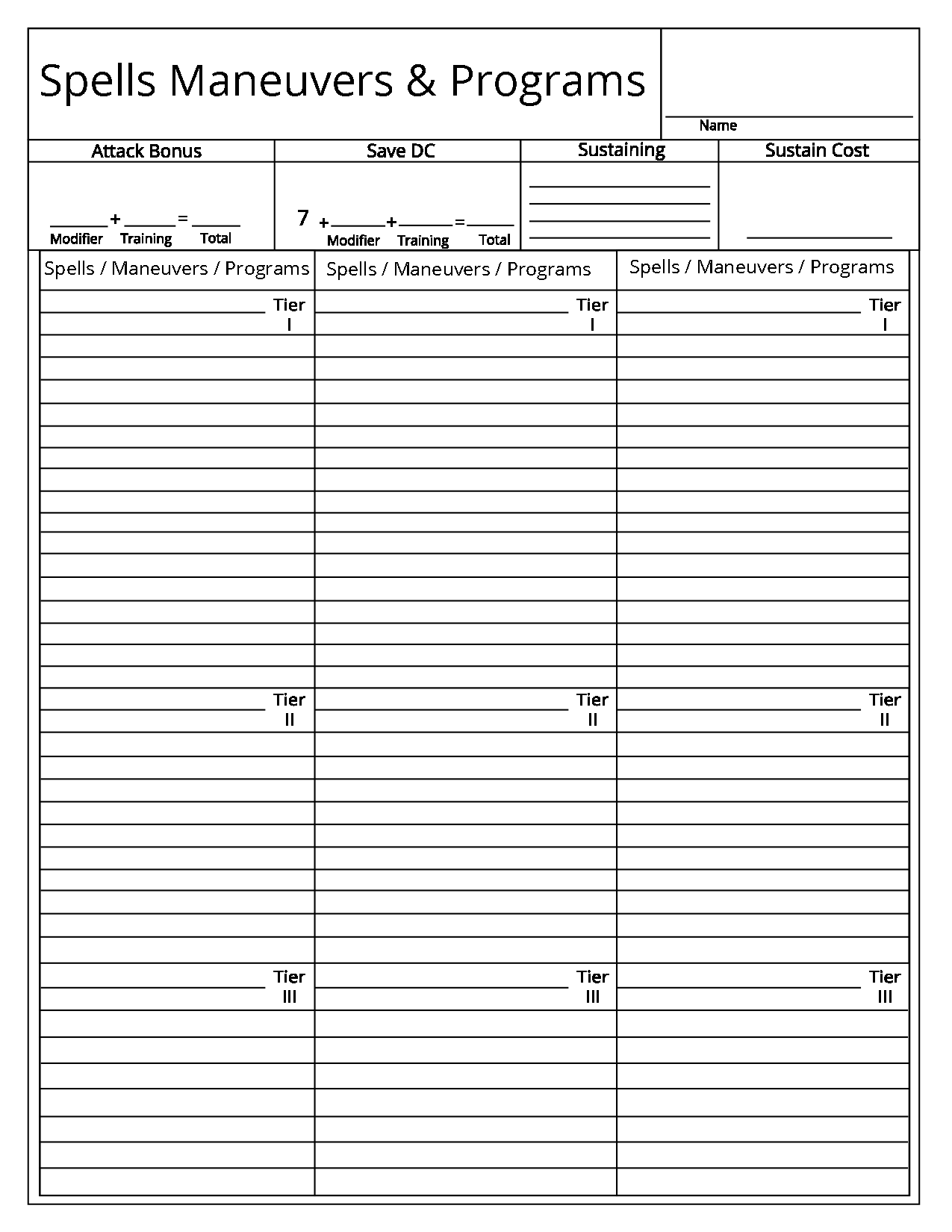Character Creation
Guides you step by step through the initial choices of creating a character.
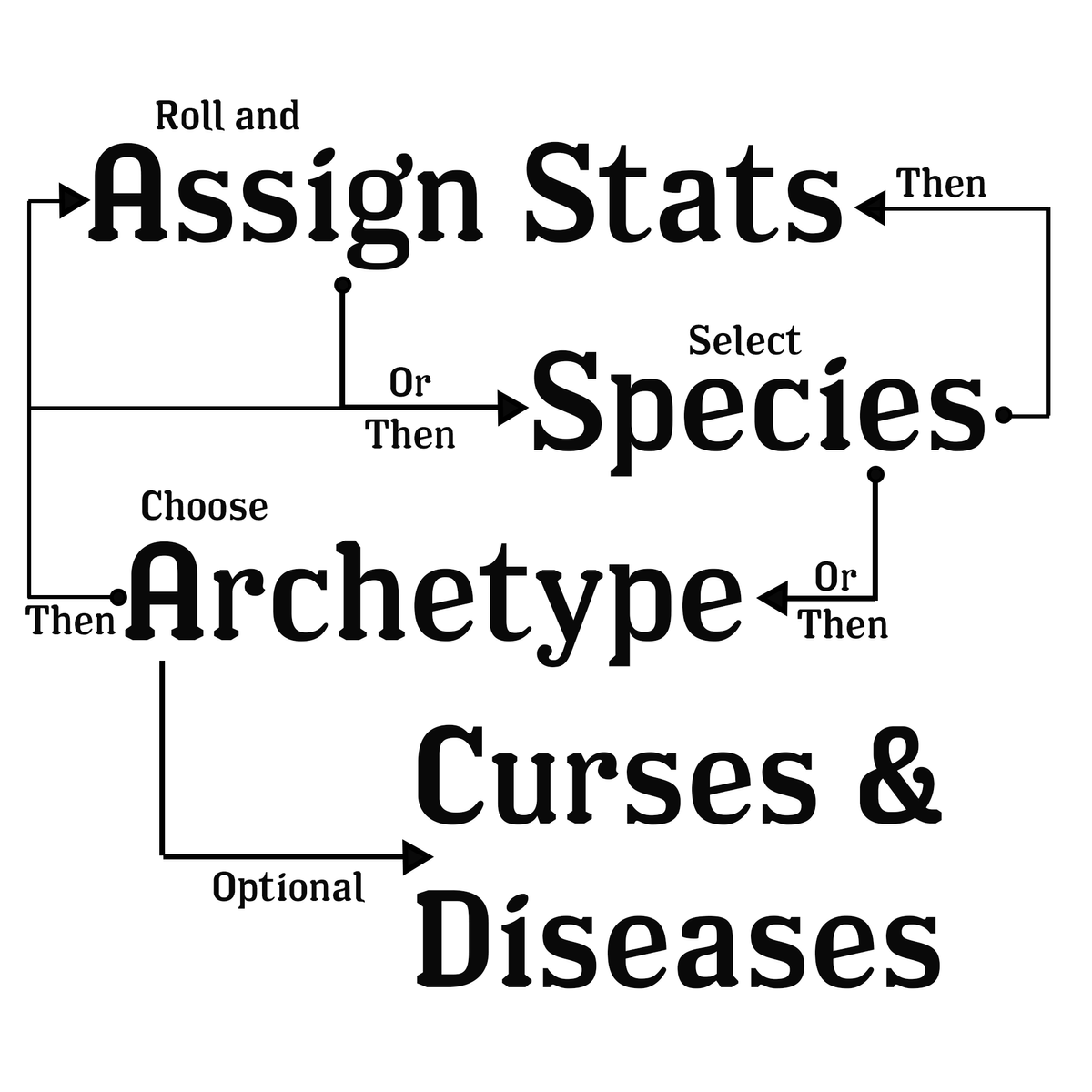
The following section outlines the initial choices involved in the creation of a character and guides you through the process with clickable links.
Character Sheets
Altered Realms, like most Tabletop RPGs, utilizes characters sheets to track and quantify information about the characters we are roleplaying. While it may seem intimidating at first, this guide will help you become familiar with every aspect of the character sheet, and will have you ready to play the game in no time. Below is the 1st page of a standard Altered Realms character sheet. The following section will briefly explain each of the visible elements, from where they are derived and how to fill them out.
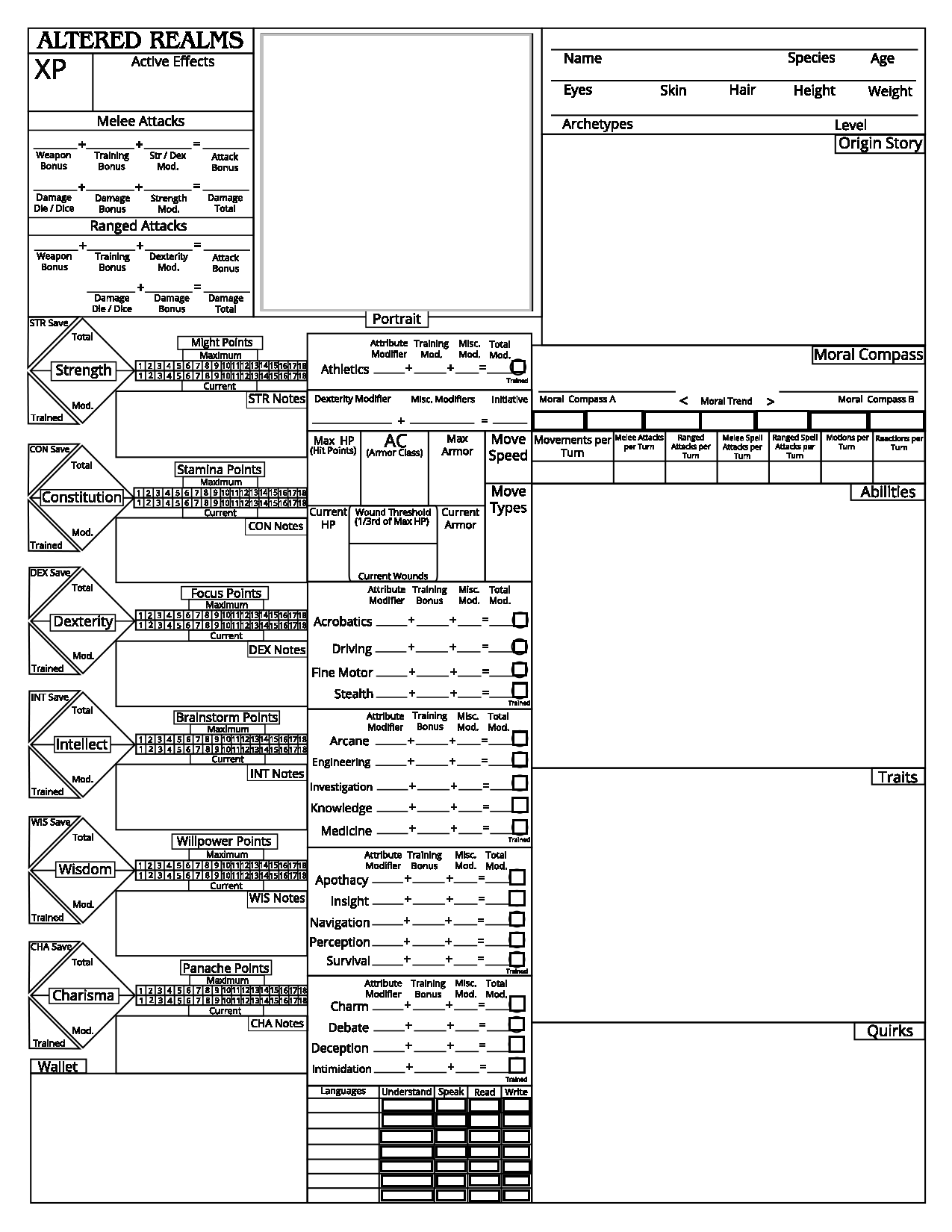
Experience Points(XP)
Experience Points or XP is a common mechanic used in most RPGs. It is often granted when a character successfully performs actions, defeats enemies or gains insight. It often quantifies character growth and gives players a game experience that is continually evolving. Altered Realms utilizes a Point Buy System that uses the XP you gain as the Points spent to create and level up a character. When you create your character the Narrator should tell you what level character you will be playing and how much XP you will be granted to build said character. You can then use that XP to purchase Archetypes, Traits and Abilities during character creation and level up.
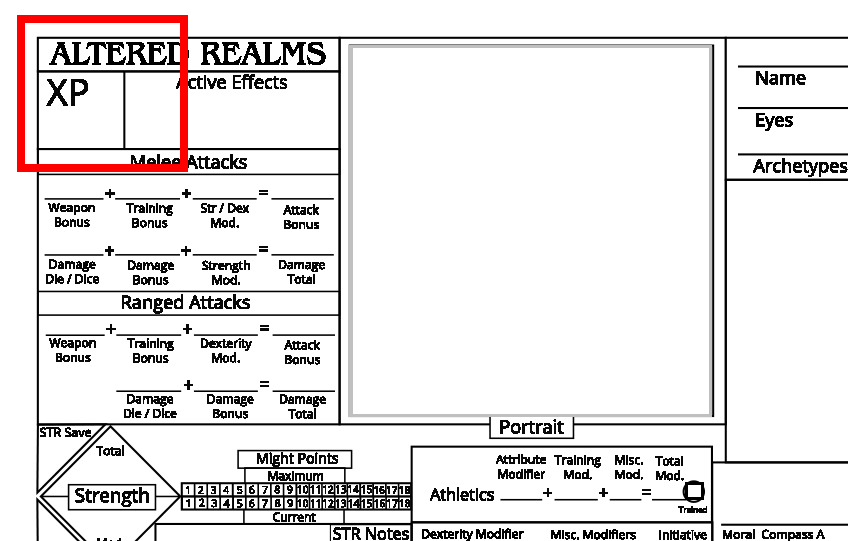
Attributes
One of the first things that should be done when generating a character is to roll your character's base Attributes Values. You may keep these values unassigned while you decide on a species that will increase one or more attributes. Assignment of these values to the six Attributes on your character sheet can be done or changed at any time during character creation but not after.
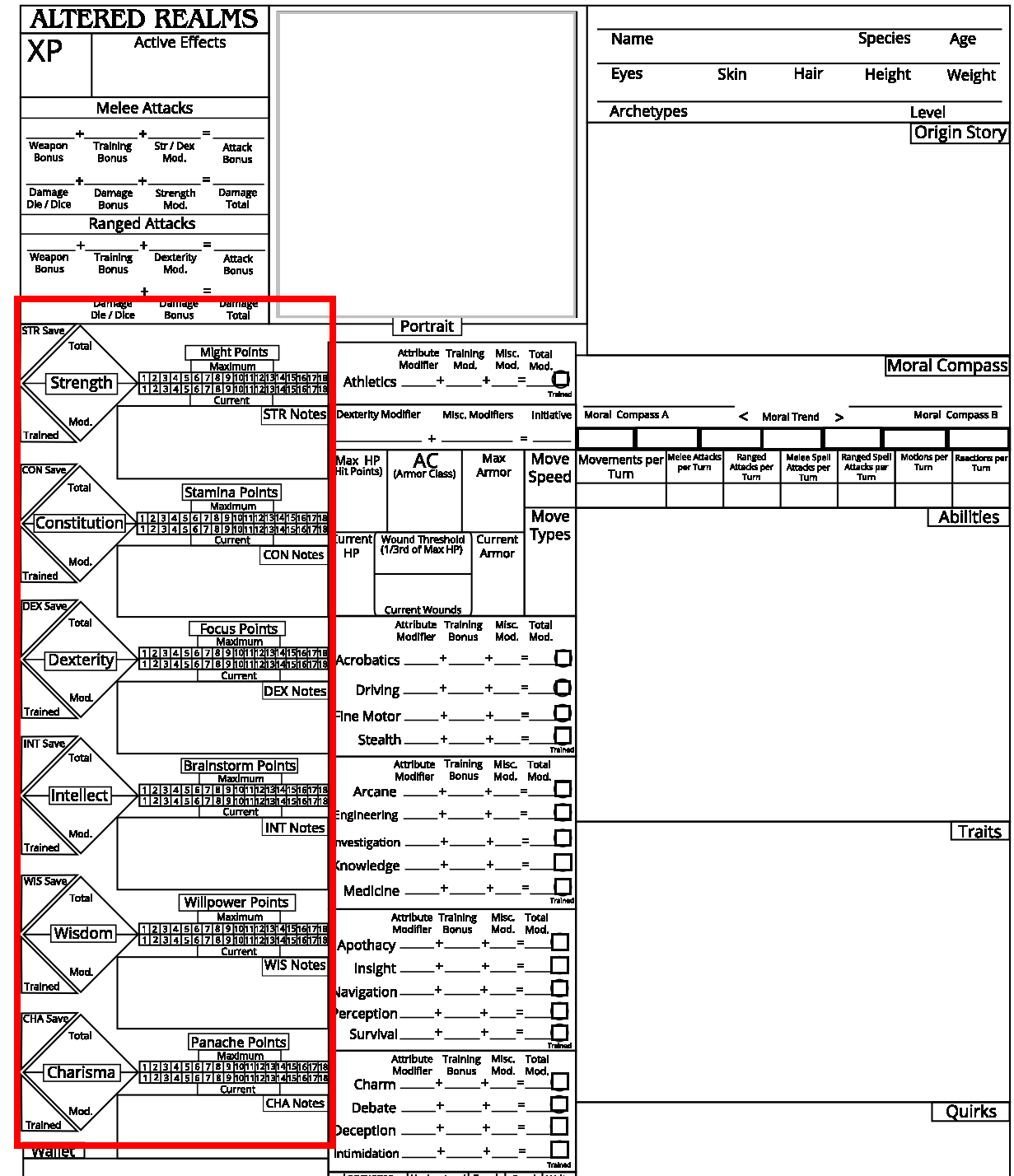
Rolling Attributes
To Roll Attributes for any character you will need 4 six sided dice. Roll the set of 4 dice and remove the die that rolled the lowest number. Add the numbers visible on the remaining dice and record the total. Repeat the process 5 times after the initial time for a total of 6 recorded roll totals. If the combined total of all recorded rolls is less than 75 you may repeat this process until you achieve a total combined number between all recorded rolls that is 75 or higher. Now, assign each of the recorded roll totals to one of each of your six Attributes: Strength, Constitution, Dexterity, Wisdom, Intellect and Charisma.
The Six Attributes and Attribute Resource Pools
Strength - Is a measure of the amount of physical force a creature is capable of generating as well as their ability to perform physically strenuous tasks, such as, running, climbing, flying, swimming, fighting or digging. The Modifier derived from your Strength Total will directly effect the amount of Might Points your character will be granted.
Constitution - Is a measure of a creatures overall health and immune system strength and a measure of the creatures metabolism or energy reserves. The Modifier derived from your Constitution Total will directly effect the amount of Stamina and Hit Points your character will be granted.
Dexterity - Is a measure of a creatures overall reaction speed, flexibility and personal precision. The Modifier derived from your Dexterity Total will directly effect the amount of Focus Points your character will be granted.
Wisdom - Is a measure of a creatures life experience, situational awareness, patience and personal willpower. The Modifier derived from your Wisdom Total will directly effect the amount of Willpower Points your character will be granted.
Intellect - Is a measure of a creatures IQ, wit, knowledge retention and problem solving ability. The Modifier derived from your Intellect Total will directly effect the amount of Brainstorm Points your character will be granted.
Charisma - Is a measure of a creatures ability to manipulate the way they are perceived by others, general likability and ability to effectively communicate with other creatures. The Modifier derived from your Charisma Total will directly effect the amount of Panache Points your character will be granted.
Saving Throws
A Save, such as a Strength Saving Throw is mechanic used in many RPG systems to determine how an area or un-rolled attack, or spell effects the creatures caught in their areas. They are rolled by the defender rather than the instigator. The defender uses a d20 roll with the appropriate Saving Throw Modifier applied to the result. If the defender meets or exceeds the saving throw Difficulty Challenge(DC) they are considered to Pass the Saving Throw. If they do not meet or exceed the DC they are considered to Fail the Saving Throw. A Passed saving throw usually reduces the damage taken or causes the defender to avoid the effect entirely. A Failed Saving Throw usually causes the defender to take the full brunt of the effect.
Attribute Resource Points (ARP)
Attribute resource points are derived from a combination of a characters correlating Attribute Modifier and Traits. ARP can be used to activate a variety of Spells, Maneuvers and Programs that allow characters to perform feats that would be unimaginable to the uninitiated. While each Attribute Resource Pool is derived from its correlating Attribute Modifier, if the modifier is a zero or negative the character is still considered to have a value of 1 in that Attribute Resource Pool.
Notes
These sections can be used to include notes about that specific attribute or ARP Pool. That way when the Narrator asks how you managed to have a 22 strength you can point out how those values were added.
Species
Your character’s Species defines their genetic heritage and grants them certain species traits, abilities and attribute point bonuses. This is where many people begin creating a character and will help you establish which attributes your species traits will enhance. It can also help you fill out the descriptive field about your character since possible ages, heights, weights, skin types and hair and eye colorations are often determined by a character's species.
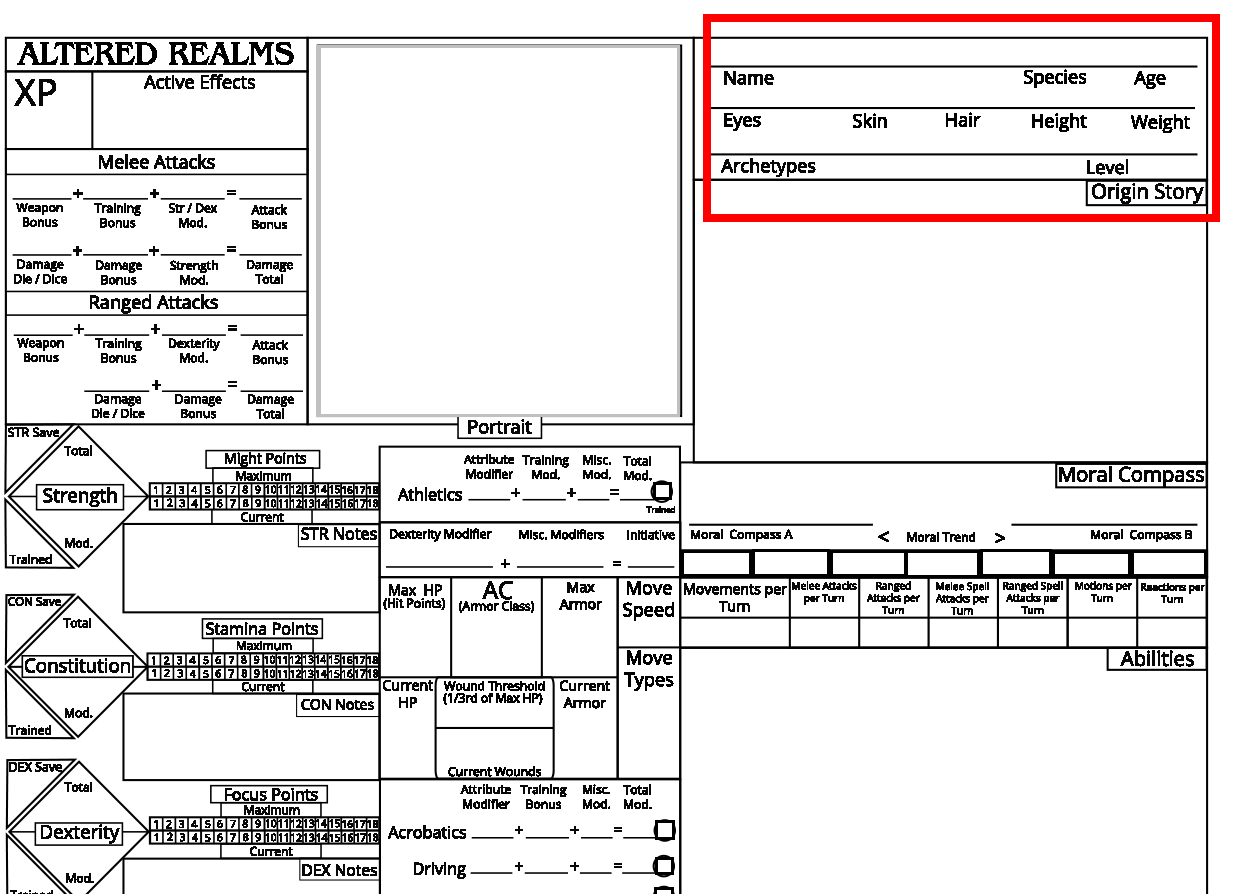
Archetypes
A character’s Archetype is a bundling of traits, skill training, abilities and acquired or issued equipment that would be accumulated in certain fields of work or service. Most if not all characters will have one or more archetypes. While Experience Points can be spent in however you desire, spending within the selections offered by a particular archetype will result in more specialized and potent characters. Spending XP outside of archetype options or in various archetypes will often result in more versatile and balanced characters.
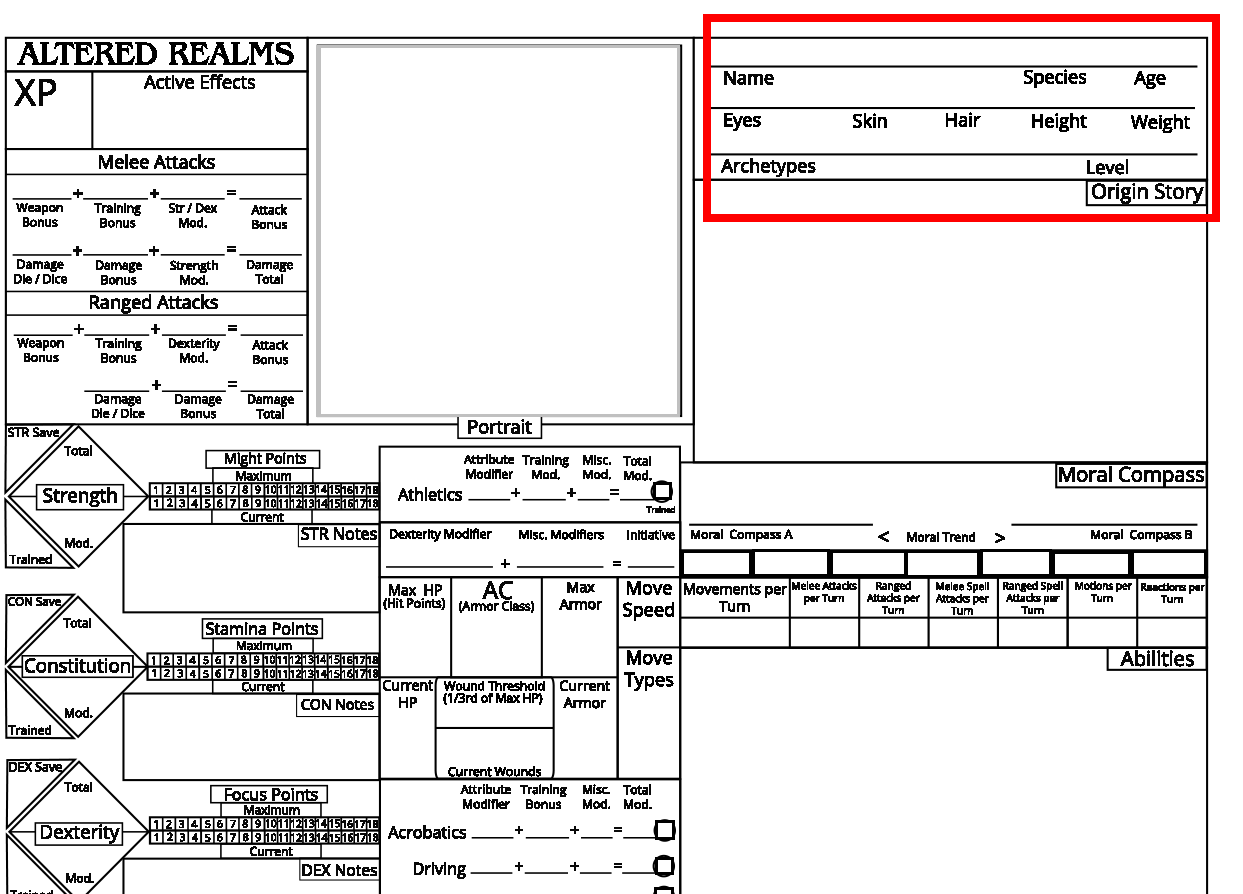
Curses and Diseases
Your Narrator may permit you to choose to play a cursed or diseased character, or you may become afflicted with one during the course of your campaign. These include but are not limited to: Undead curses, such as Vampirism and Zombification, Blood curses, such as Werewolfism and a menagerie of strange and fictional Diseases. Each curse or disease can be expanded and upgraded by spending experience points during character creation or level up. Any curses or diseases should be recorded in the active effects section of your character sheet. Any Traits or Abilities acquired from these curses or diseases should be recorded in the corresponding Traits and Abilities sections of your character sheet.
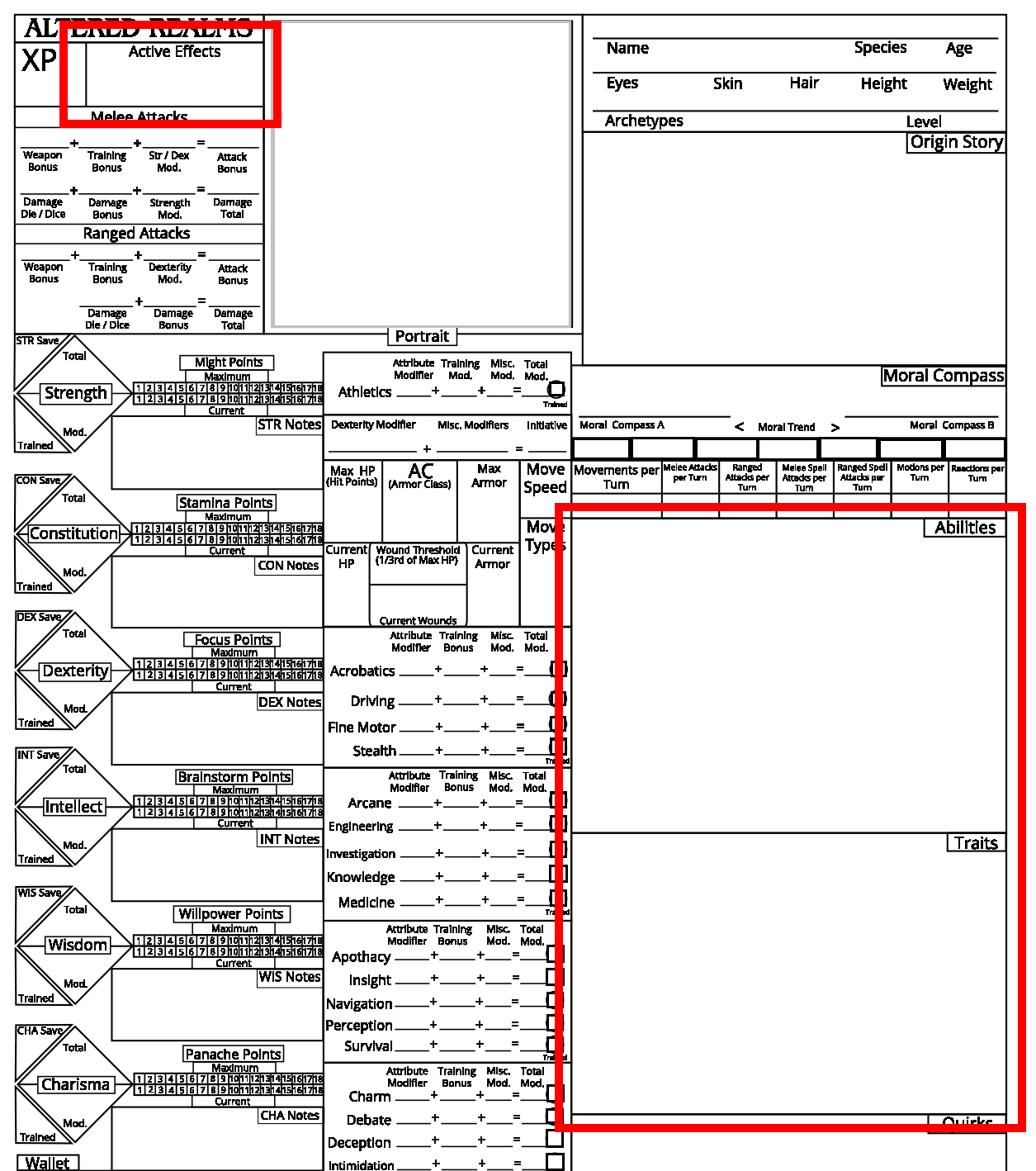
Origin Story
This section is a blank space for you to write out a brief description about how your character got where they are the time of their character's introduction. Your narrator may be willing to grant extra XP, equipment, funds or items depending on the contents of this origin story.
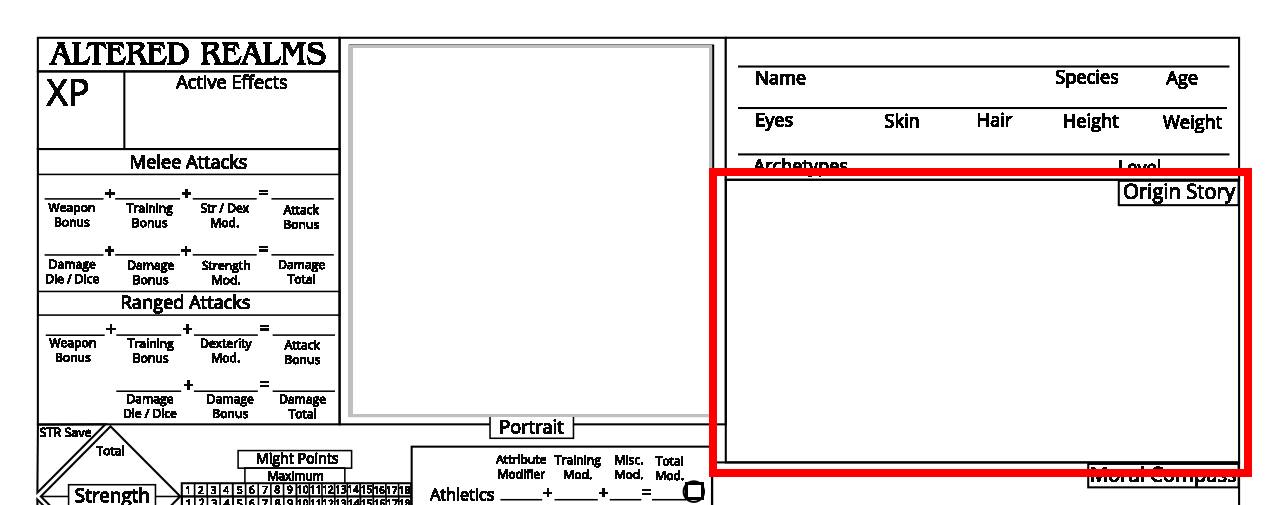
Portrait
This is a blank section provided for you to include an artistic rendition of your character or import an image on the PDF version of the character sheet.
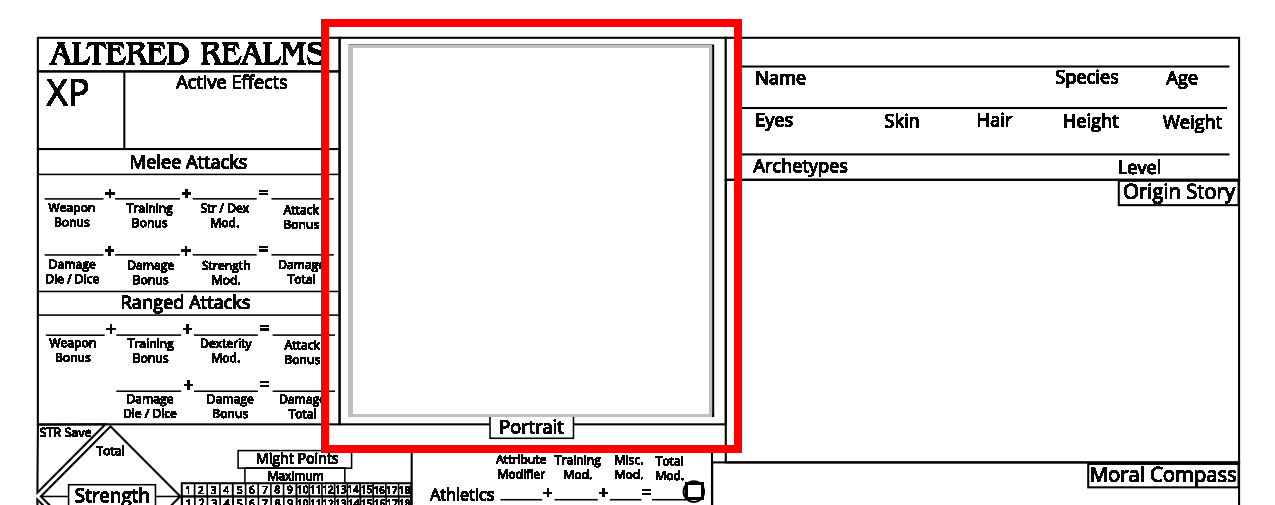
Traits and Abilities
Traits and abilities are the modular building blocks of Altered Realms characters. They allow players to quickly choose what their character can do and how well they do it.
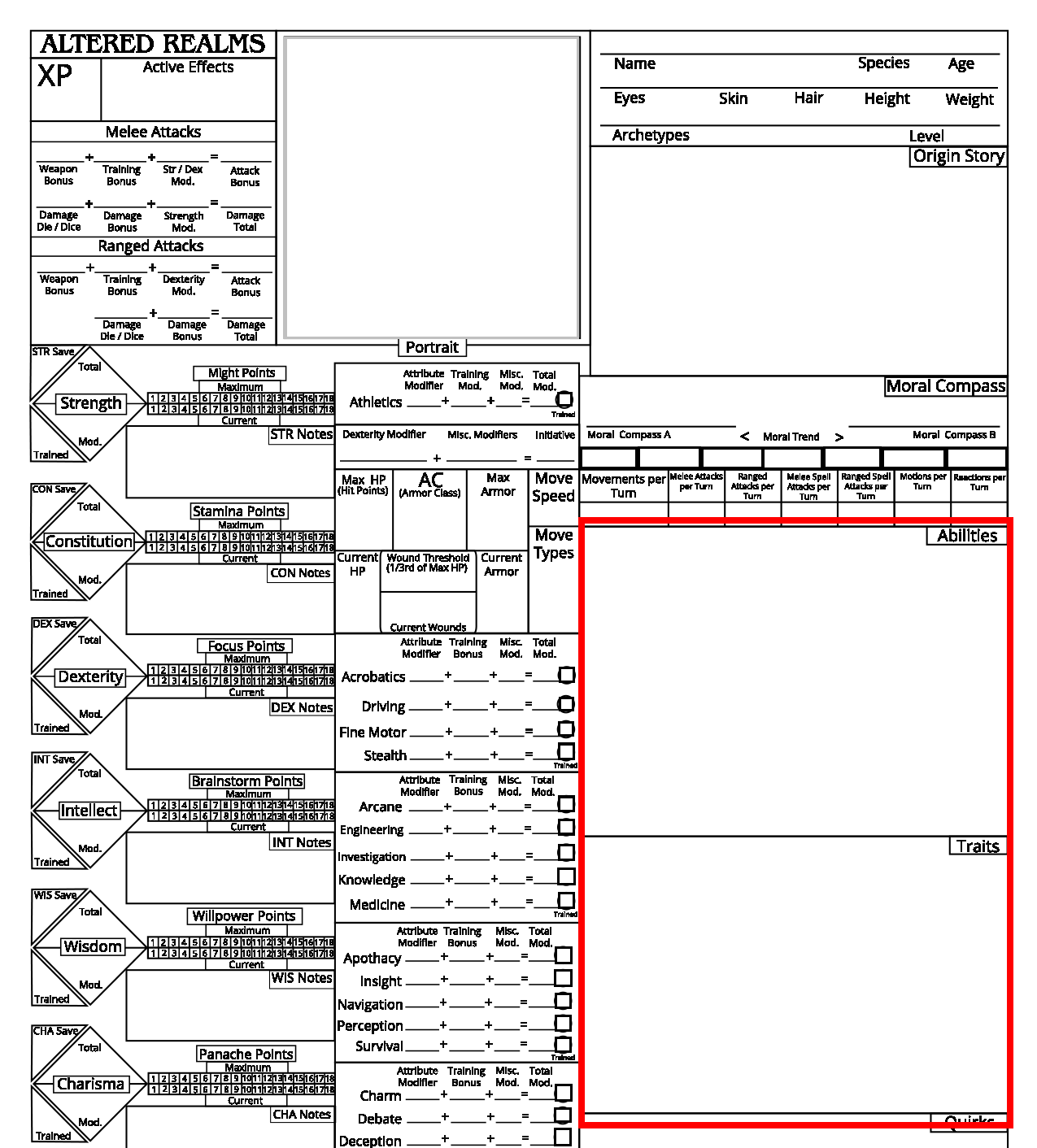
Abilities
Abilities are activated actions your character has access to such as surgery or the ability to cast magic.
Traits
Traits are static bonuses that are applied to various numerical values on a characters character sheet, such as their movement speed or number of Melee Attack Actions.
Quirks
A character's quirks are behaviors, physical differences and psychological conditions that make them unique and interesting. All quirks grant various XP rebates and negative modifiers. Essentially rewarding your character with more XP for overcoming hardship. Quirks should always be limited by the Narrator. A good general rule is to limit the XP gained from quirks to a low number such as 1, 2 or 3.
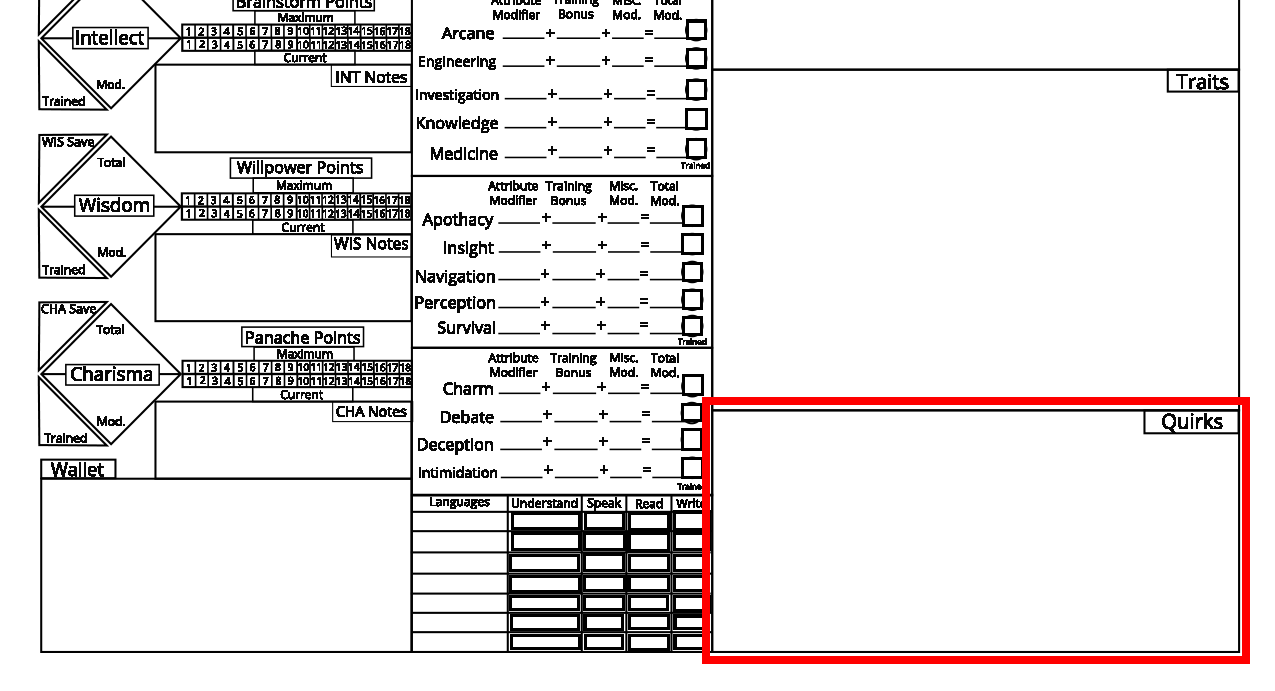
Moral Compass
A character's moral compass acts as their basis for making moral decisions and often dictates what they believe, what their motivations are and how they will react emotionally to a given situation. Characters should have two current moral compasses. They can often be changed later by a traumatic character event, over time or via the prompting of the Narrator. You can choose any two moral compasses for your character that you like, narrator permitting. If you want a character built to develop and grow over time then we recommend you choose two opposing moral compasses. If you want a stout and resolute character with unwavering faith in their morals then we recommend you choose two similar moral compasses. Your Moral Position will dictate where your character currently rests in their moral reasoning between those two moral compasses. Your Moral Trend indicates which direction your moral position is currently headed based on you recent actions during sessions.
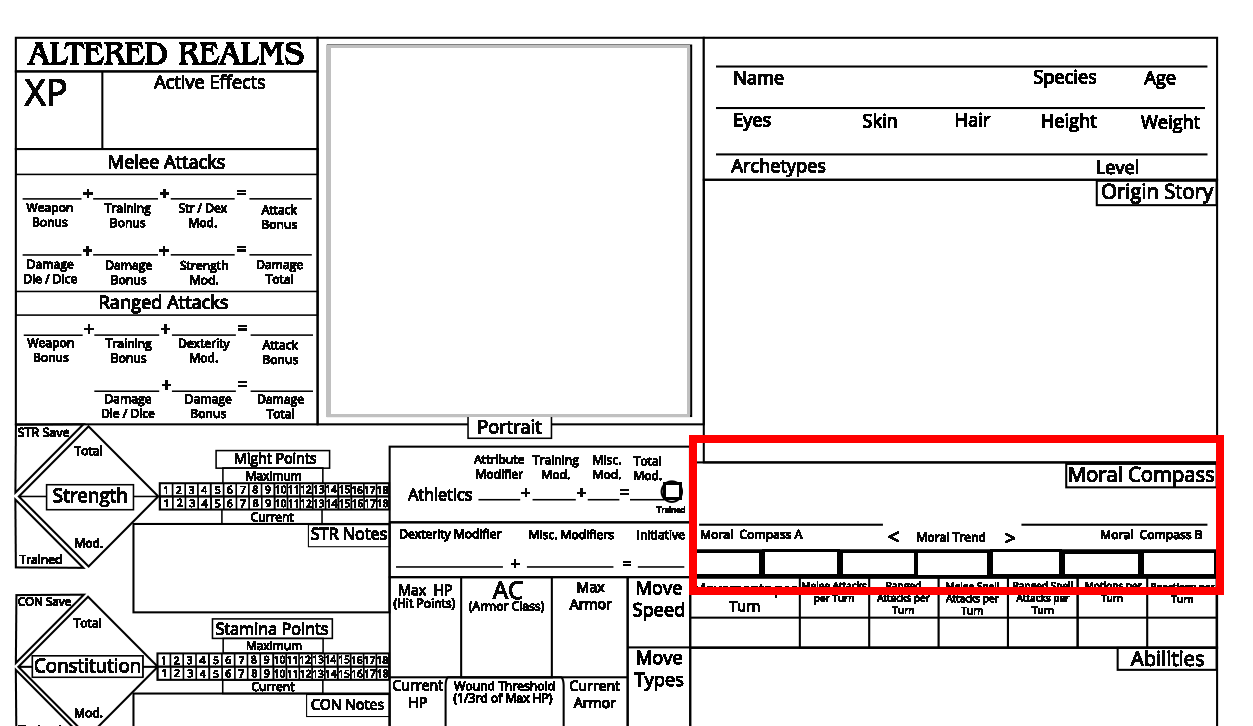
Attacks
This section allows you to fill in all the modifiers that effect your Melee and Ranged Attack and Damage Rolls. Once you have filled out all the spaces with your individual modifiers you can use this section to quickly determine what to add to your attack and damage rolls with your currently equipped weapon.
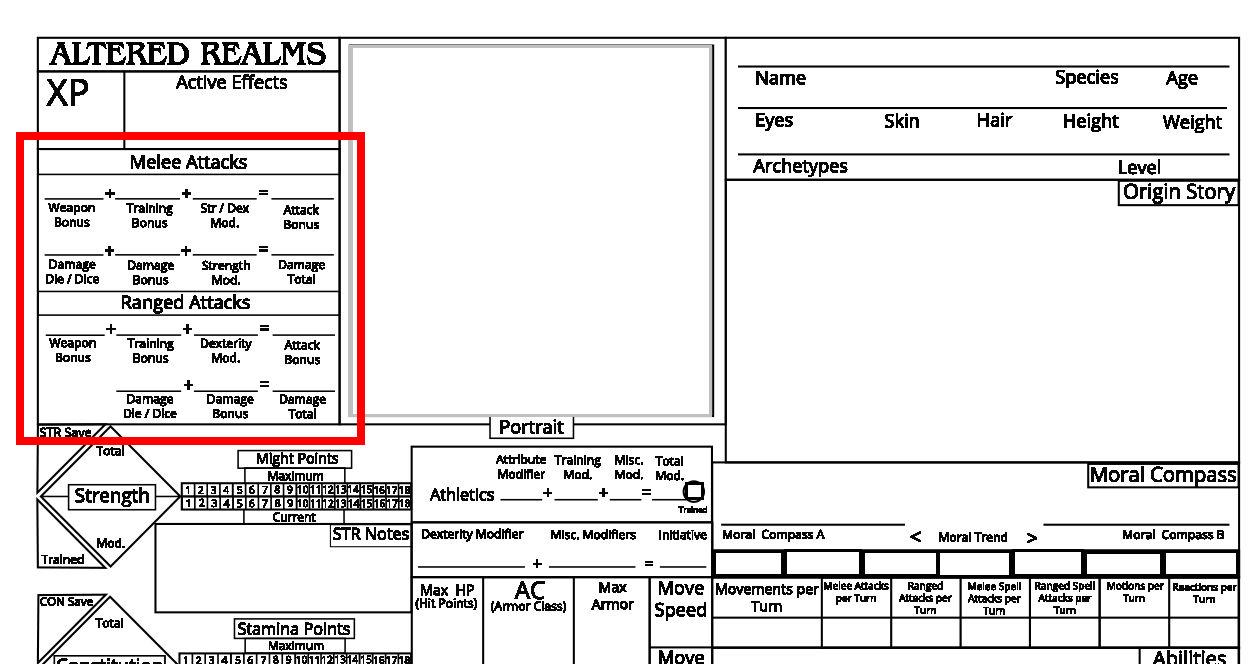
Defenses
This section of your character sheet is used to quantify your characters, Armor Class or AC, maximum and current Hit Points or HP, maximum and current Armor, Wound Threshold (1/3rd of maximum HP), Initiative, Movement Speed and Movement Type(s).
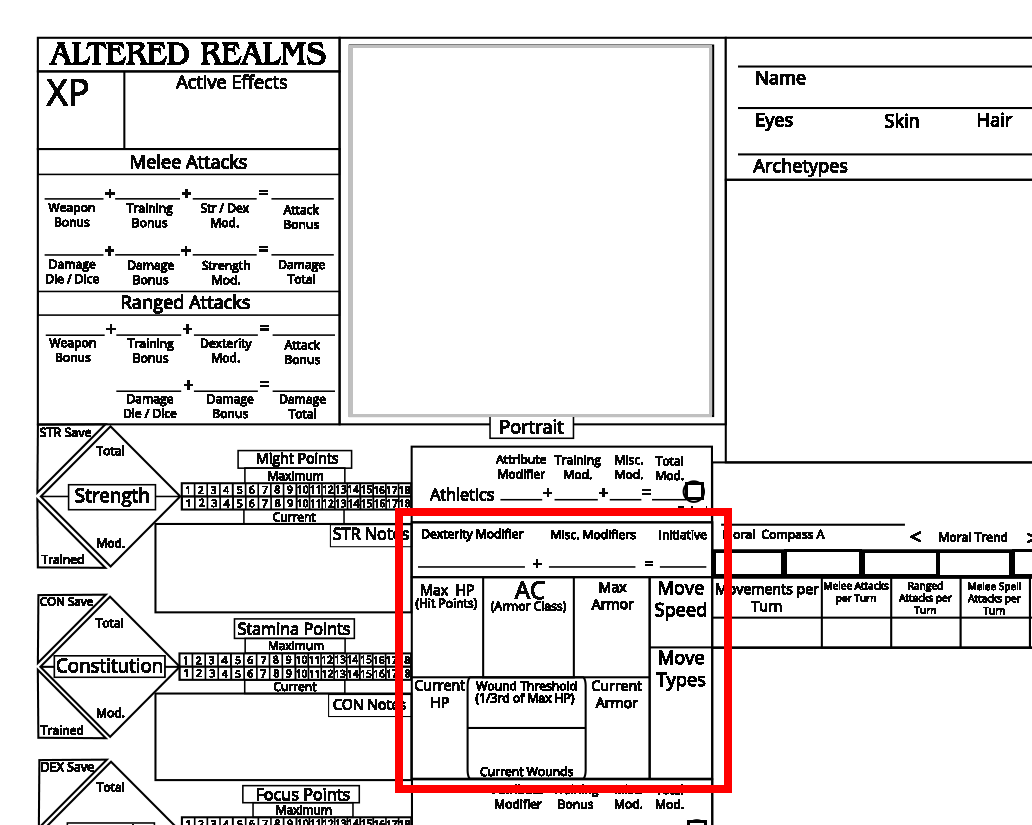
Armor Class(AC)
Your character's armor class determines how difficult it is for another creature to cause damage to you with targeted attacks. A characters AC is determined by their Dexterity Modifier and the Armor they wear. If a creature wishes to damage you they must Roll and Attack and meet or exceed your AC or cause you to roll a Saving Throw that you Fail.
Hit Points(HP)
Your HP is derived from your Species and Traits and is a measure of a combination of your characters vitality and resolve.
Armor Points
Your Armor Points are determined by a combination of your Species, Traits and Equipment and is a measure of your characters defenses that can be damaged or destroyed without causing harm to their user.
Wound Threshold
Your Wound Threshold determines when you character is Wounded by receiving damage to their HP. A characters Wound Threshold is by default, equal to one third of their maximum HP. Wounds are a type of rolled negative effects that cannot be recovered from as easily as conditions or HP/Armor Damage.
Initiative
Initiative is a measure of your characters reaction speed and is derived from your Traits and Dexterity Modifier.
Movement Speed and Type
A characters movement speed indicates how far they can move in a given amount of time. It is measured in Meters and indicates the number of meters a character can move using a single Movement. A characters movement type indicates how they move that distance and can include types such as: walking, crawling, slithering and flying. All movement types have certain advantages and disadvantages.
Allotments
This section of your character sheet allows you to quickly check how many acts of a given type your character has available to them. These values are affected by a number of various Species and Archetype Traits.
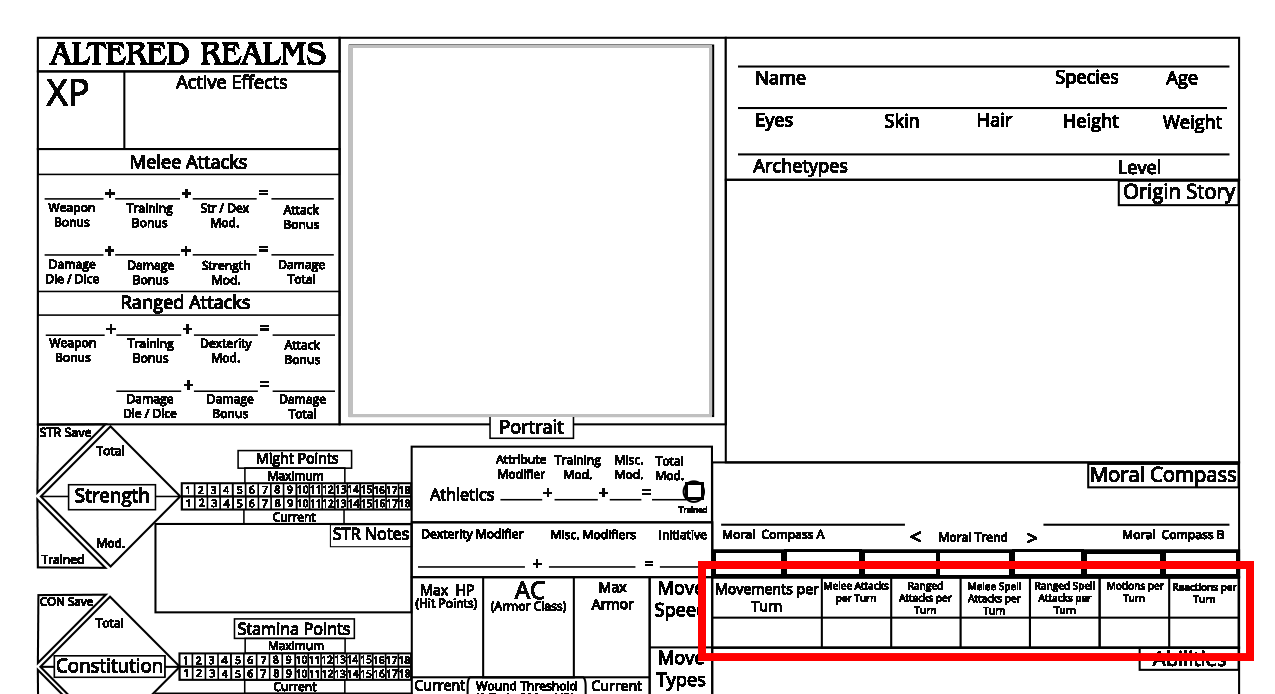
Skills
Skills are how your character will perform complicated tasks that require skill and experience. They are determined by your Species, Traits, Archetype and Attribute Modifiers. You Training Modifier is a flat bonus applied to all skills of which your character is considered to be trained. It is derived from your characters Level and Traits. Miscellaneous Modifiers are often acquired through Traits and Abilities or Temporarily through Spells.
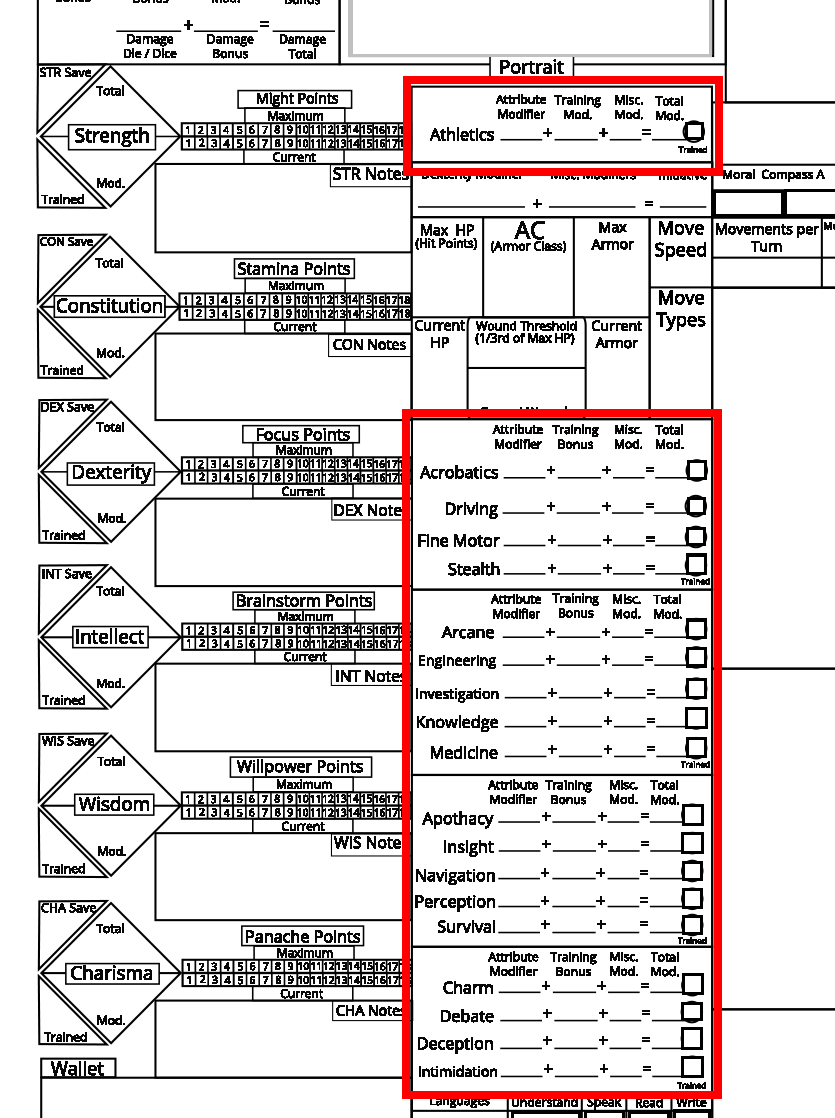
Languages
The Language Section determines how, and in what languages and formats your character is capable of communicating. It is derived from your Species and/or Traits.
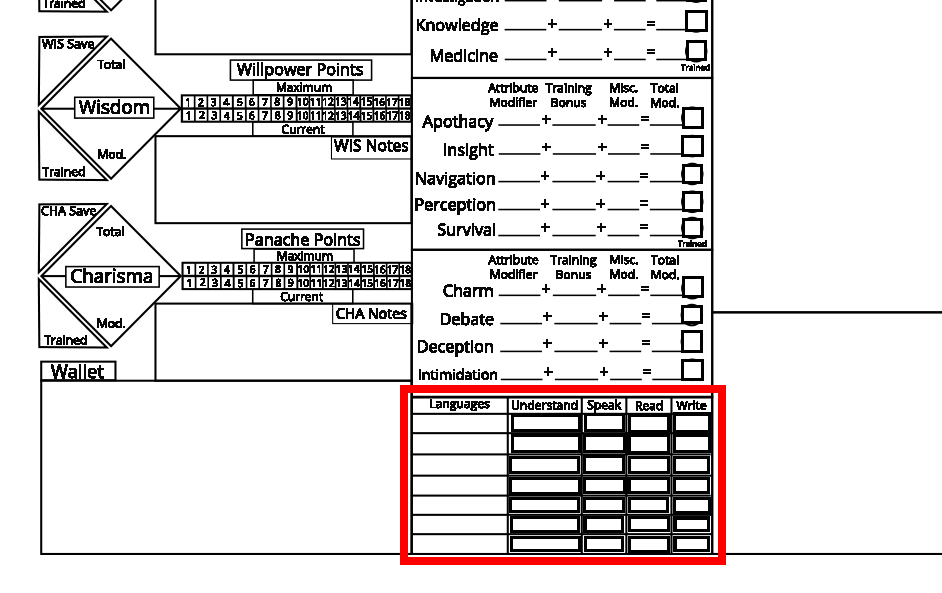
Wallet
The wallet section can be used to track the amount of funds your character currently has on their person.
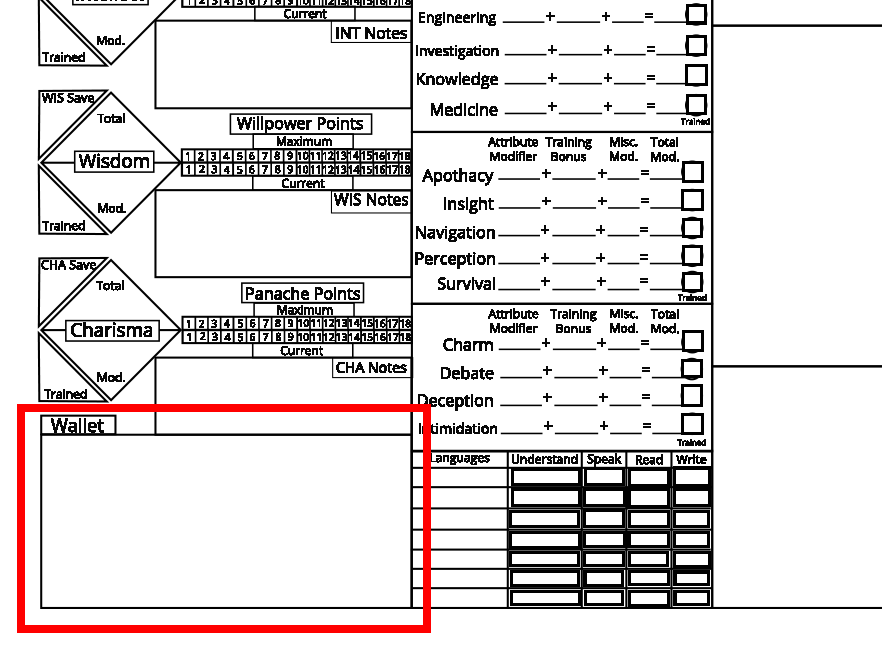
Inventory
The second page of the character Sheet Set is the Inventory Page. It includes all the character's belongings, clothing, armor, weapons and accoutrements. It also includes a section for stored inventory, the contents of the character's backpack, a space for collected finances and a list of all that character's contacts and connections. If you're looking to stock up the inventory of your character, select one of the Buyer's Guide buttons below. Your Narrator should indicate which Buyer's Guide you are permitted to use.
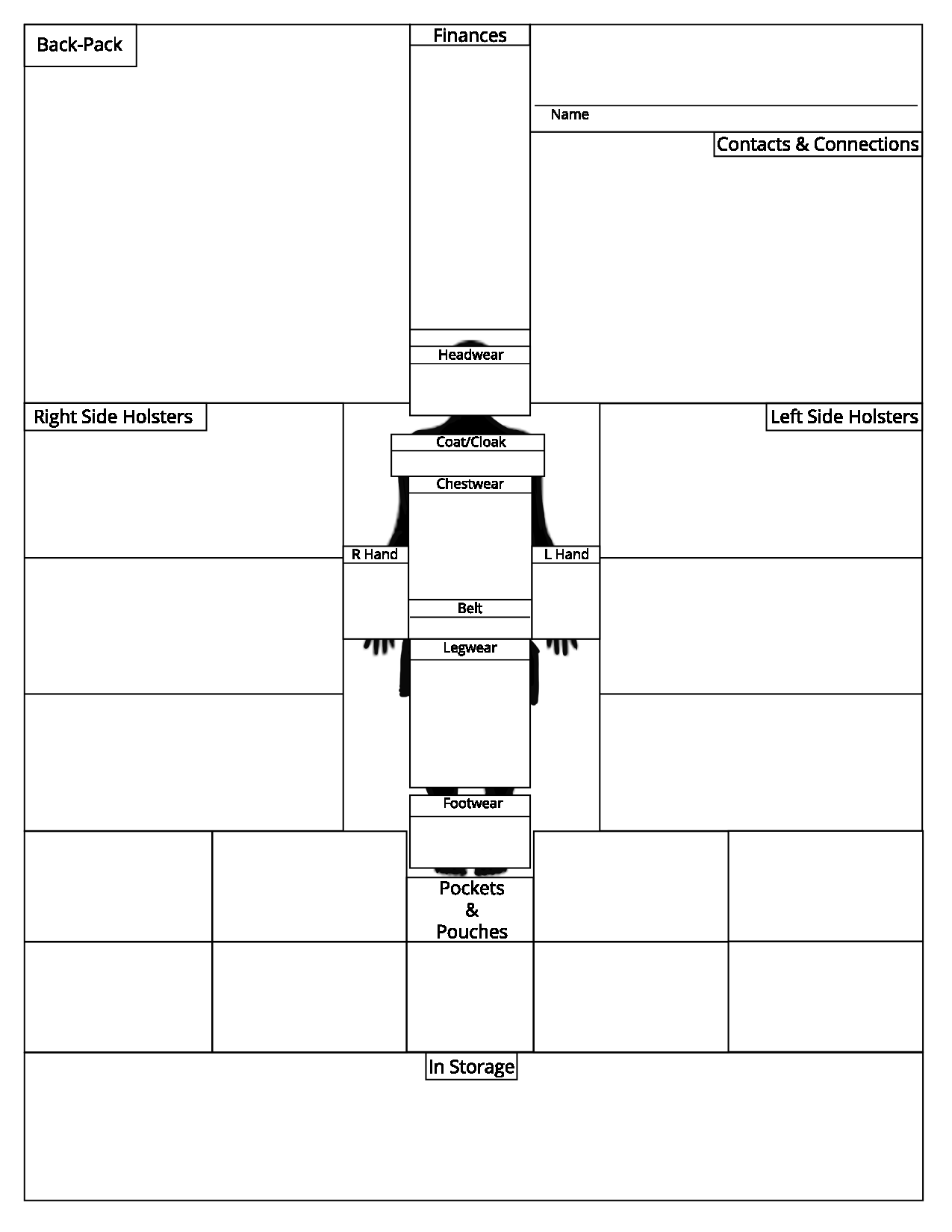
Accessibility
Holsters - Drawing a weapon typically requires a Motion, unless otherwise stated by the weapon or one of its Traits or a Trait the character possesses. Holsters are usually considered to be visible unless the weapon has the "Concealable" Trait. Whenever you acquire or purchase a weapon it should come with an accompanying Holster, Sheath, Case or Scabbard unless otherwise stated by the Narrator.
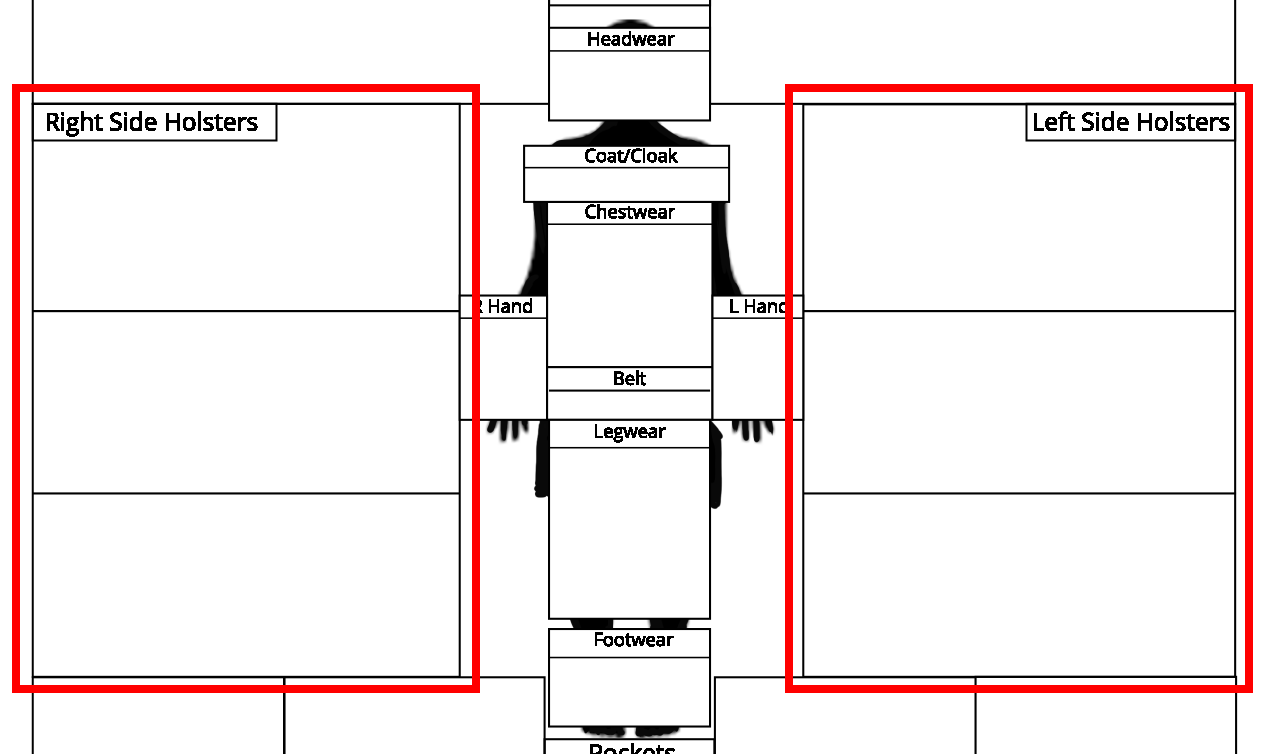
Belts, Bandoliers and Pockets - Grabbing and item off a specific place on your belt or bandolier, as a rule, should always require a Motion. The same goes for pulling something out of your pocket or pouch. It's a swift confident motion that you've most likely performed hundreds of times and requires very little concentration to do.
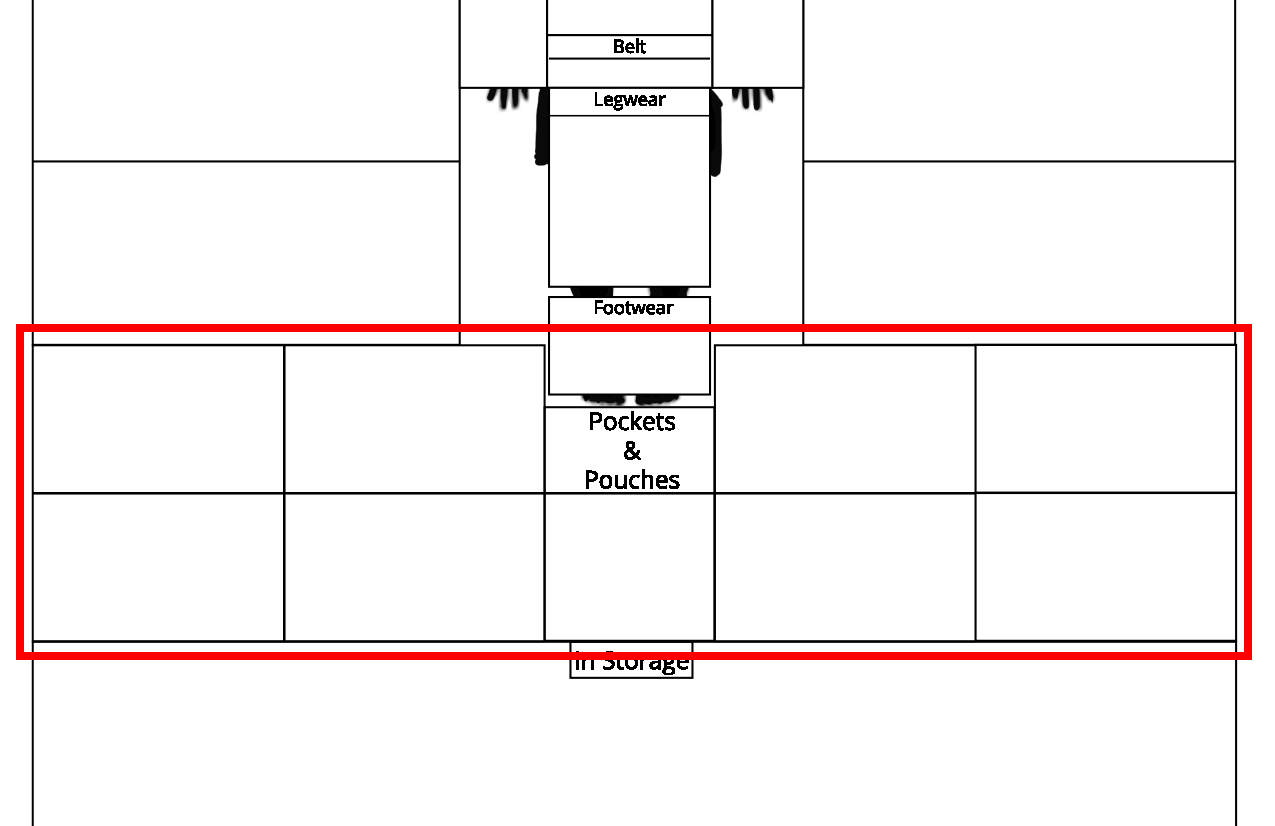
Backpack - Grabbing an item out of your backpack is called "Rummaging" and it typically requires and Action to use that much attention to search through your bag in the heat of the moment.
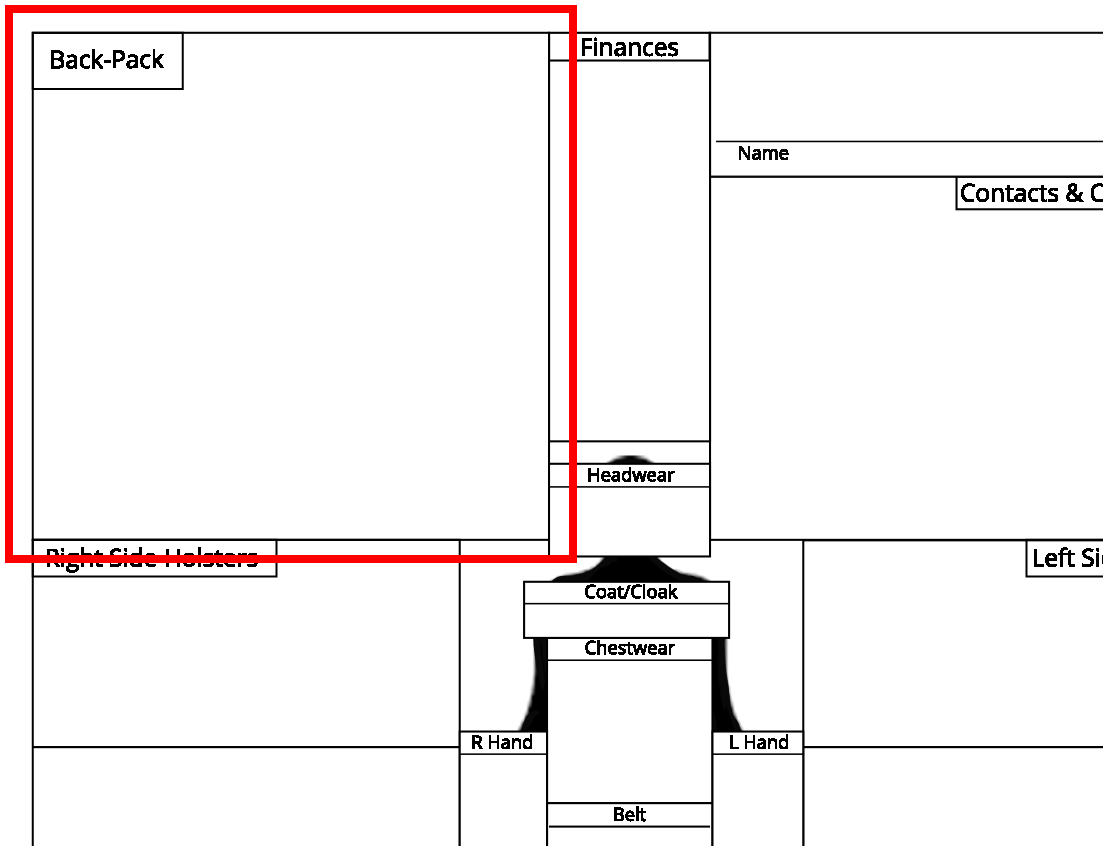
In Storage - Items "In Storage" are considered to be stored at a specific location and cannot be accessed by the owning character unless they are in that location.
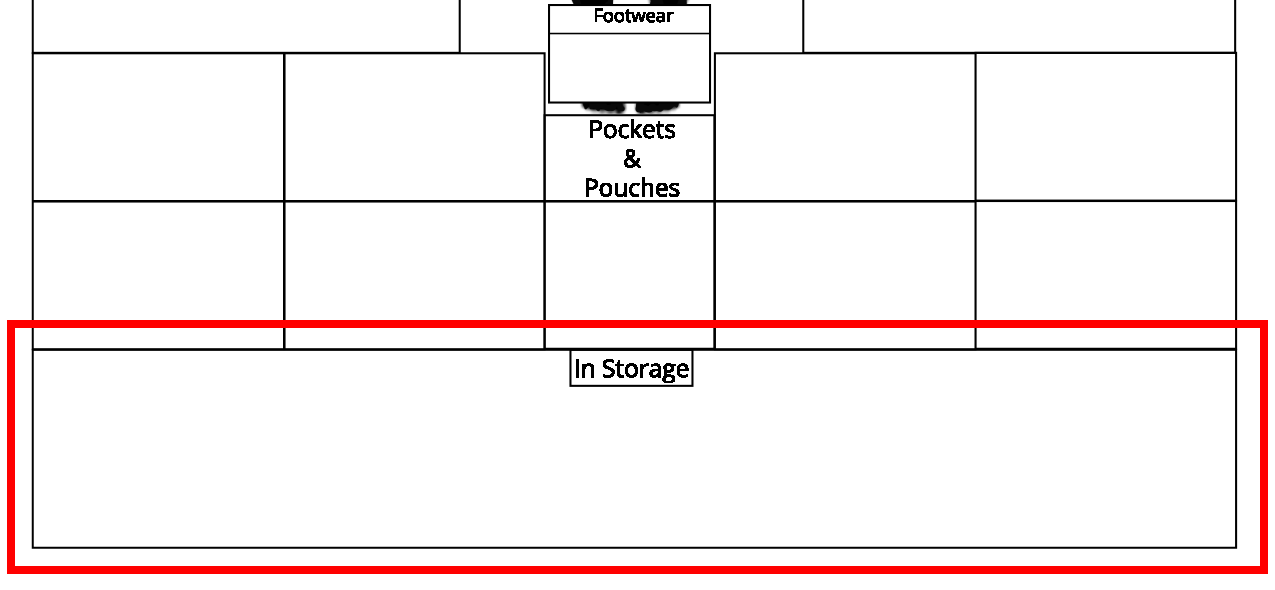
Armor and Clothing
Armor and clothing is broken down into various types and grants induvial bonuses for maximum mix and match potential. Each part of the body has a section to record your character's apparel and the Traits and Bonuses it grants.
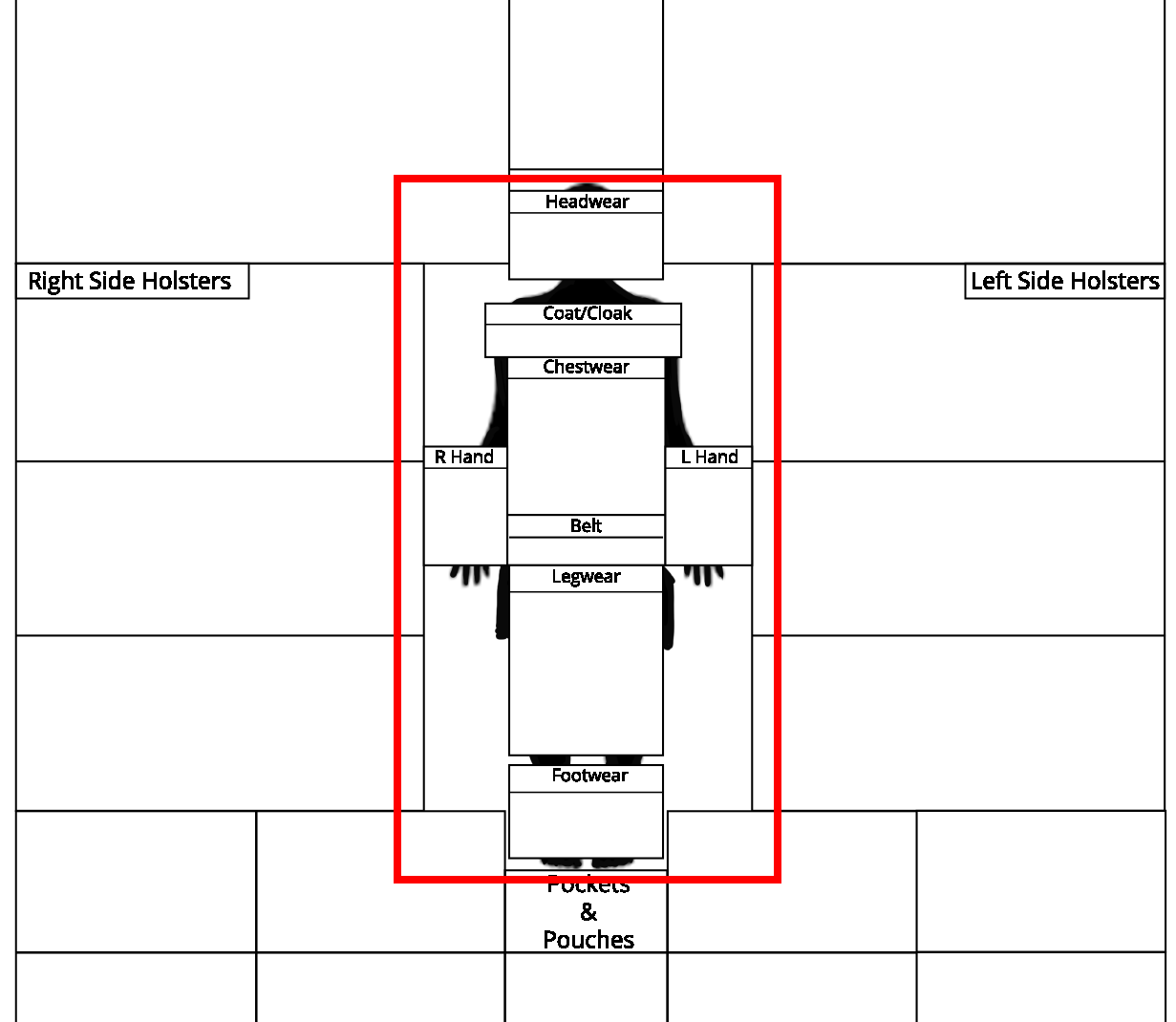
Finances
This section is for you to record your character's finances. Things such as: regular income, loans, bets, deals and stored funds.
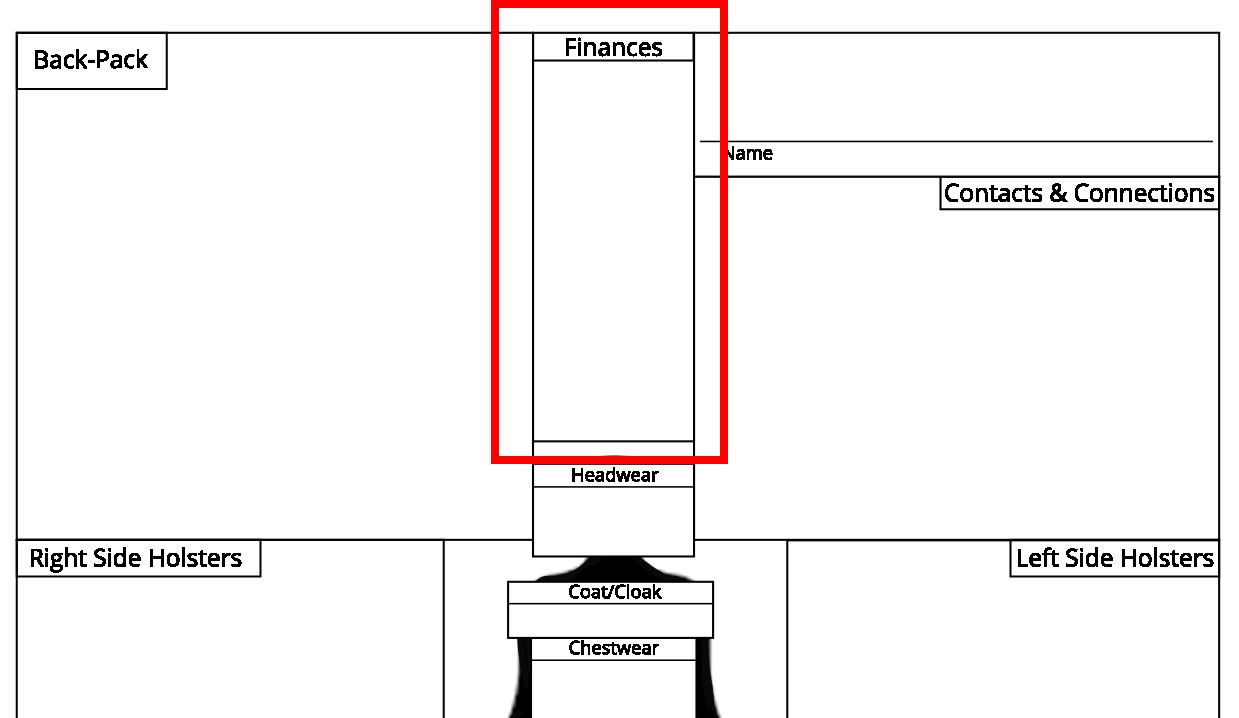
Contacts and Connections
This sections is a space to record any friends and allies you have made along the way, as well as any organizations with which you have become affiliated. Contacts and connections can often offer you specific bonuses depending on their type.
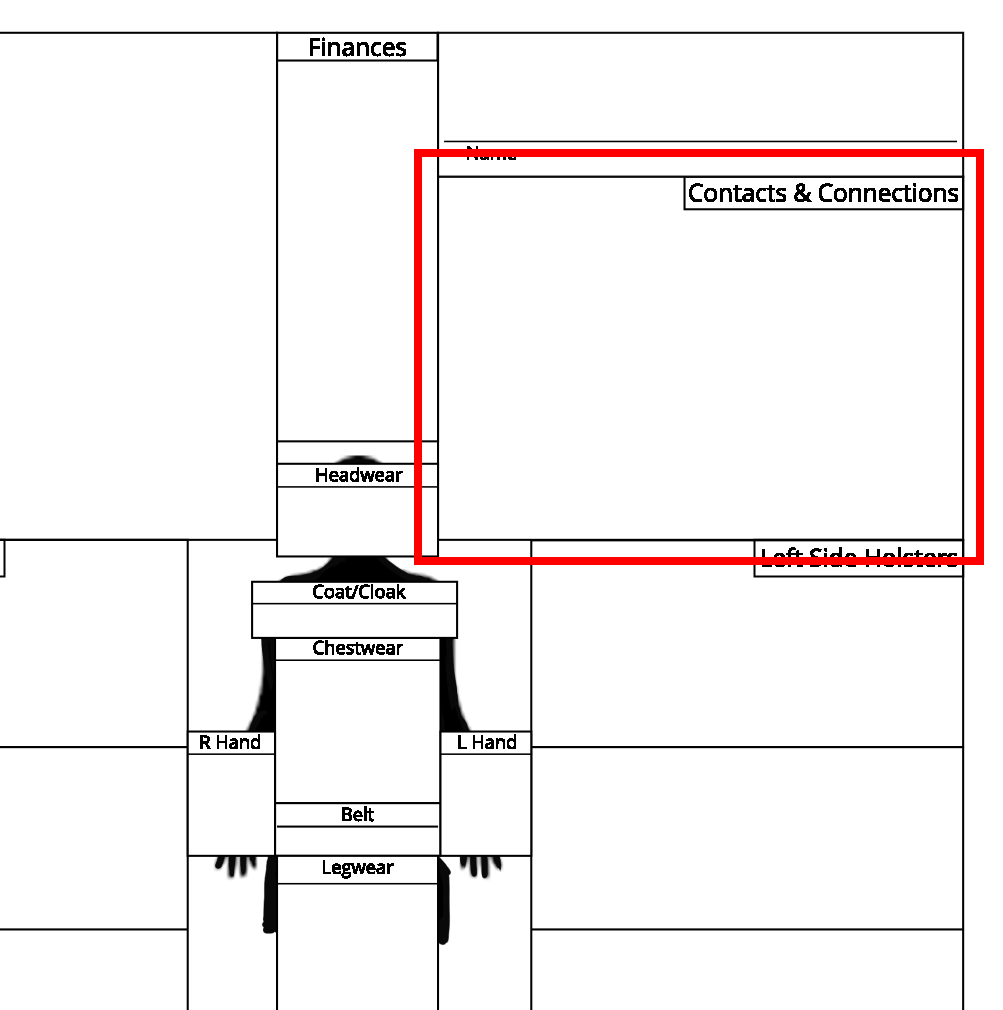
Spells, Maneuvers and Programs
Page three of the Character Sheet Set contains space to record all Spells, Maneuvers or Programs your character may acquire. In addition to that, it includes a place to keep track of sustained spells, maneuvers and programs and their associated sustain cost. It also includes a section for Non-Weapon Attacks and Save DCs for a quick reference when your character utilizes certain Spells, Maneuvers and Programs.
